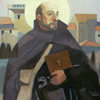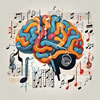
looking for Eyewitnesses
Dear Friends,
When the leaders of the early church compiled the New Testament, they had a range of manuscripts, books, and letters to choose from. The question was: which of these were worth preserving as ‘sacred Scripture’ alongside the Jewish Bible? When it came to the biographies of Jesus (aka the gospels), the early church was not interested in myths but looked for facts – what had really happened – especially when it came to that most crucial of events: the resurrection of Jesus, the story of Easter. So, they decided to accept only eye-witness accounts of Jesus’s life. Any ‘gospels’ that were written in retrospect by people who had not met Jesus personally were disregarded.
There is something uniquely powerful about a personal story. Sometimes, one single eyewitness with lived experience can be more persuasive than a whole panel of experts. Especially when it comes to things that are deeply ‘incredible’ but true, such as this story of a crucified and buried man returning to life. Any reasonable person would dispel it as a myth and a lie. Nevertheless, hundreds of thousands of people (from all layers of society and cultural backgrounds) converted to Christianity in the first century. What convinced them to overcome their initial scepticism? Perhaps this could only be credited to the stories of eyewitnesses – authentic women and men who had really met Jesus after his resurrection.
At St Thomas’s we are looking for eyewitnesses too. Not to prove another faith story or to write a new book for the Bible, but simply to preserve the ‘lived experience’ of our own community – the stories and memories of the more recent past. The National Lottery has awarded us a grant to conduct an oral history project, to record the stories of real people like you and me – not the rich and famous who so often shape the narrative of history. In a world flooded with AI-generated deep-fakery, we look forward to celebrating the power of authenticity – at Easter, and beyond.
Love and prayers,












